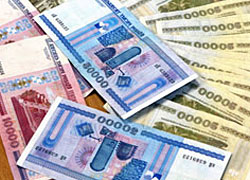
Economic Problems Beset Belarus
Publication: Eurasia Daily Monitor Volume: 6 Issue: 49
By:

To date, there has been little other than optimistic prognoses from Belarusian government circles about the state of the economy. Unlike the situation in neighboring states, Belarus is not facing recession, and economic growth continues. Moreover, President Alyaksandr Lukashenka has assured citizens of government protection, should the situation become difficult. The Belarusian economy has a unique structure, in which state intervention has been common until recently; and the official media has proclaimed a specific Belarusian path to prosperity. Is it possible that the country has been unaffected by the international recession that is affecting its neighbors such as Poland, Ukraine, and Russia so strongly?
The answer is that the Belarusian government is treading a fine line between myth and reality. Nothing is quite as it seems. While its leader Lukashenka, aided by the head of the presidential administration Uladzimir Makey and Prime Minister Syarhey Sidorski, make overtures to the European Union and fulfill the requirements for the next tranche of an IMF loan, they also seem to be drawn irrevocably further into the Russian orbit, not only politically—as a base for Russian anti-missile defense—but in particular economically. And its population is increasingly anxious about the economic situation the country finds itself.
In late February the Belarusian authorities reported an anticipated growth in GDP of 2 percent in 2009, though the rise for the manufacturing industries will be only 1 percent (Belarusian Telegraph Agency, February 24). That figure stands in contrast to the fall of GDP in neighboring states, even though the GDP growth overall is significantly less than in previous years. The country also announced that in 2009 it would have a balanced budget without deficits. As a result, the IMF was happy to disburse the first tranche ($800 million) of the $2.46 billion "standby arrangement" agreed to last January (Belapan, March 10). In April an IMF team will visit Belarus to ensure that it is adhering to the stringent conditions.
In addition to its negotiations with the IMF, Belarus has begun to open up to its European neighbors as well. Yet in other respects, the state seems to be drawn back to Russia. First of all, Russia has become a virtual banker to Belarus. In 2008 it loaned Belarus $2 billion, and it received a request from its smaller neighbor for a further $3 billion for 2009 before the midway point of the first quarter of the year had even been reached (www.bloomberg.com, March 2). The government has requested loans from other sources, including the United States; but the fact remains that it is indebted most of all to Russia.
In the winter of 2008-2009 Belarus avoided the sort of unseemly row that occurred over gas prices between Russia and Ukraine. Belarus currently pays $140 per thousand cubic meters for Russian gas and is confident that the price could fall to $100 by the end of the year. In the long term it has resolved to circumvent its dependence on Russia for energy imports by building its own nuclear power plant, the construction of which will begin in 2010. Russia, however, is set to provide the funding, materials, and even fuel for this station; and the Russian firm Atomstroyexport has been accepted as the "prime contractor," according to Russian Ambassador to Belarus Aleksandr Surikov. There is some logic to using Russian technology, given Russia’s proximity and experience in nuclear energy; but this choice draws Belarus further into the Russian economic orbit. The Russians have offered a $5 billion loan for the completion of the station, which, in contrast to earlier reports, will now be built in Astravets, in Hrodna region, close to the border with Poland and Lithuania (www.naviny.by, February 6).
In a recent survey conducted by the Independent Institute for Socio-Economic and Political Research (IISEPS) in December 2008, 1,500 respondents from different regions of the country were asked what the most serious problem "facing our country and its citizens" was. Over 82 percent stated price rises, well ahead of the next three categories, which predictably were impoverishment of the population, unemployment, and the collapse of production (37.8 percent, 35.7 percent, and 31.7 percent, respectively). Incidentally, the answer "fear of the loss of Belarusian independence" was the choice of only just over 5 percent. More than one-third of respondents maintained that their personal economic situation had worsened over the past three months, and almost half (46.4 percent) anticipated serious shocks for the Belarusian economy in the future. As to who was responsible for the economic deterioration in the country, 52 percent declared it was the government, 42.5 percent the president, and only 27.4 percent blamed "the West" (www.iiseps.org/eopros53.html).
Thus, the Belarusian leaders, despite a more benign international political climate, are facing two growing problems: increasing indebtedness to and reliance on Russia, Lukashenka’s rhetoric notwithstanding; and a loss of public faith in the government. The survey elicited the most negative reactions in many years, and it suggests that the public is no longer satisfied simply to accept official statements that there is no economic crisis in Belarus. For many of them, the crisis is already manifest. The shock of the 20.5 percent currency devaluation in January has been followed by a further 10 percent drop in the value of the Belarusian ruble, which is now traded at 2,880 to the dollar (3,000 on the black market). Discontent with the Lukashenka regime is rising.




